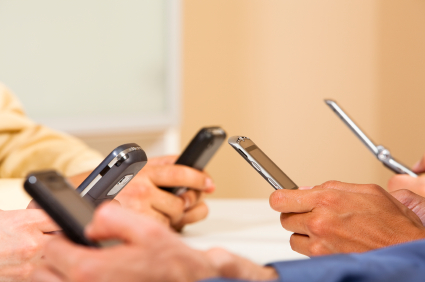
I was recently in a meeting with 8 people in the room. (Which is about 5 too many…)
I looked around and observed that over half of the participants were working on either a laptop, cellphone or tablet.
They were not “in the meeting.” In fact, they were barely participating. Their minds were elsewhere.
Why have a meeting if people are going to do other work?
Maybe we need to eliminate all these technology distractions.
How would things be different?
Gadgets of Mass Distraction
What if you banned technology from your next meeting?
No phones.
No tablets.
No laptops.
Just people.
Maybe a pen and some paper.
Without all the clicking, beeping, and ringing…
How would your meetings transform?
Be warned, you might get some shocked participants.
You might even get some revolt, “But, I need my laptop… to um, take notes!”
Instead, tell your team members to bring a notebook. (A good moleskine is the perfect size.)
Ban Tech for Better Meetings
Most companies need better meetings. (See Al Pittampalli’s book here.)
Others still need to skip meetings entirely.
However, many suffer from technology overload. If you cannot get through a discussion without a cellphone buzzing or someone click-clacking on a laptop, then it may be time to try a different tactic.
Here are 5 Reasons You Should Ban Tech From Your Next Meeting:
- Shorter Meetings – With fewer distractions and interruptions your meetings will not take as long. You might even be able to cut them in half.
- Better Decisions – When people’s mind are “in” the discussion they can provide more insightful input. Your team will make better decisions if their heads are “in the game.”
- Fewer Interruptions – Every time a phone rings or some stops to read an email, you have to restart your meeting. Time, ideas, and productivity are negatively impacted. We have all been in the meeting where the table continues to hum with sound of vibrating cell phones. It’s not just annoying, it’s counter-productive.
- More Active Participants – When your attendees are not doing other work, they are more likely to contribute to the issue at hand. Ever been in a meeting where all heads are down in laptops? I can guarantee you that people are not paying attention, nor are they contributing.
- Less Meetings – How many meetings fail, only to spawn a follow-up meeting? By keeping people involved, you will actually require less meetings. Every been to a “series” of meetings that should have been one gathering?
Check All Gadgets At the Door
I challenge you to ban technology in your next meeting.
Tell attendees to leave their laptops and phones at their desk.
Or, check them at the door. Have a side table or basket for attendees to surrender their gadgets.
You just might find that you have shorter, better, and yes more productive meetings.
Do your meetings get interrupted by technology? Share your experiences below.
 I am the author of Time Management Ninja and help individuals and companies reclaim their time to be more productive. As well, I am the author of the book
I am the author of Time Management Ninja and help individuals and companies reclaim their time to be more productive. As well, I am the author of the book 

Great post! Love it! Definitely going to start doing this more at work!
Great post! Love it! Definitely going to start doing this more at work!
Nice one, Craig.
I like having the technology available in order to refer to things if necessary, but this could be achieved by having one piece of technology under the sole control of the meeting organiser, I guess.
There would certainly be a lot of raised eyebrows here if we ‘banned’ tech from our meetings. But I’m going to try it and see how it goes down. Fingers crossed!
@adycoles Let me know how that goes… and what reactions you get. 🙂
@adycoles Let me know how that goes… and what reactions you get. 🙂
Nice one, Craig.
I like having the technology available in order to refer to things if necessary, but this could be achieved by having one piece of technology under the sole control of the meeting organiser, I guess.
There would certainly be a lot of raised eyebrows here if we ‘banned’ tech from our meetings. But I’m going to try it and see how it goes down. Fingers crossed!
Great post! Love it! Definitely going to start doing this more at work!
Great post! Love it! Definitely going to start doing this more at work!
Nice one, Craig.
I like having the technology available in order to refer to things if necessary, but this could be achieved by having one piece of technology under the sole control of the meeting organiser, I guess.
There would certainly be a lot of raised eyebrows here if we ‘banned’ tech from our meetings. But I’m going to try it and see how it goes down. Fingers crossed!
I fully agree. Put the damn things away, focus on people, connect, decide, act – then get the hell back to work!
I’ve written about it (and stirred up a bit of a debate). http://whowritesforyou.com/2011/01/27/in-meetings-pen-paper-not-glass-and-fingers/
@cptnrandy Randy… thanks for sharing! Great post.
You and I have been on the same wavelength a couple of times recently. 🙂
@cptnrandy Randy… thanks for sharing! Great post.
You and I have been on the same wavelength a couple of times recently. 🙂
I fully agree. Put the damn things away, focus on people, connect, decide, act – then get the hell back to work!
I’ve written about it (and stirred up a bit of a debate). http://whowritesforyou.com/2011/01/27/in-meetings-pen-paper-not-glass-and-fingers/
I fully agree. Put the damn things away, focus on people, connect, decide, act – then get the hell back to work!
I’ve written about it (and stirred up a bit of a debate). http://whowritesforyou.com/2011/01/27/in-meetings-pen-paper-not-glass-and-fingers/
Amen, Craig. This is so important for many reasons…one of which is that it sends a signal: we’re going to do business differently today…
Amen, Craig. This is so important for many reasons…one of which is that it sends a signal: we’re going to do business differently today…
@al.pittampalli Thanks, Al! We ARE going to do business differently today…! 🙂
@al.pittampalli Thanks, Al! We ARE going to do business differently today…! 🙂
Awesome recommendations, Craig! I’m all for less meetings–especially unproductive ones!
@moonliteescapes Less meetings…! Sign me up! 🙂
@moonliteescapes Less meetings…! Sign me up! 🙂
Awesome recommendations, Craig! I’m all for less meetings–especially unproductive ones!
Amen, Craig. This is so important for many reasons…one of which is that it sends a signal: we’re going to do business differently today…
Awesome recommendations, Craig! I’m all for less meetings–especially unproductive ones!
@al.pittampalli Thanks, Al! We ARE going to do business differently today…! 🙂
@cptnrandy Randy… thanks for sharing! Great post.
You and I have been on the same wavelength a couple of times recently. 🙂
@adycoles Let me know how that goes… and what reactions you get. 🙂
Craig,
This doesn’t happen only in meetings but in conferences or smaller events too – people are more interested to text messages or browse the web.
Unfortunately the most of the meetings (99%) are in virtual form and the possibility of getting distracted is even higher.
However, I would sure like to attend to a good, old fashioned meeting without any gadgets 🙂 I think that the focus and participation would be on a different level than what it is now.
Timo
Craig,
This doesn’t happen only in meetings but in conferences or smaller events too – people are more interested to text messages or browse the web.
Unfortunately the most of the meetings (99%) are in virtual form and the possibility of getting distracted is even higher.
However, I would sure like to attend to a good, old fashioned meeting without any gadgets 🙂 I think that the focus and participation would be on a different level than what it is now.
Timo
Craig,
This doesn’t happen only in meetings but in conferences or smaller events too – people are more interested to text messages or browse the web.
Unfortunately the most of the meetings (99%) are in virtual form and the possibility of getting distracted is even higher.
However, I would sure like to attend to a good, old fashioned meeting without any gadgets 🙂 I think that the focus and participation would be on a different level than what it is now.
Timo
Craig,
This doesn’t happen only in meetings but in conferences or smaller events too – people are more interested to text messages or browse the web.
Unfortunately the most of the meetings (99%) are in virtual form and the possibility of getting distracted is even higher.
However, I would sure like to attend to a good, old fashioned meeting without any gadgets 🙂 I think that the focus and participation would be on a different level than what it is now.
Timo
I say you are right for the cell phones and laptop but what about an ipad when it’ use instead of paper? Yes we can scan the paper with notes on it but this is a waste of time and paper… Thing is they are tools not gadgets and should be use accordingly. In a meeting, no need for cell phone.
@paul.mailhiot I agree there are times that technology can be “part of” the meeting.
The issue is when it is a distraction. I have seen people come into meetings, plop their laptop down and not look up the entire session. 🙂
@paul.mailhiot I agree there are times that technology can be “part of” the meeting.
The issue is when it is a distraction. I have seen people come into meetings, plop their laptop down and not look up the entire session. 🙂
I say you are right for the cell phones and laptop but what about an ipad when it’ use instead of paper? Yes we can scan the paper with notes on it but this is a waste of time and paper… Thing is they are tools not gadgets and should be use accordingly. In a meeting, no need for cell phone.
I say you are right for the cell phones and laptop but what about an ipad when it’ use instead of paper? Yes we can scan the paper with notes on it but this is a waste of time and paper… Thing is they are tools not gadgets and should be use accordingly. In a meeting, no need for cell phone.
Banning technology from some meetings is definitely a good idea. I can’t remember what that looks like! However, there are some educational meetings that I attend outside the office that I am more likely to attend because I can stay in touch with the office while I’m out.
@LitSuppGuru I am not sure I can remember a meeting where there wasn’t someone answering email on their phone… 🙂
@LitSuppGuru I am not sure I can remember a meeting where there wasn’t someone answering email on their phone… 🙂
Banning technology from some meetings is definitely a good idea. I can’t remember what that looks like! However, there are some educational meetings that I attend outside the office that I am more likely to attend because I can stay in touch with the office while I’m out.
Banning technology from some meetings is definitely a good idea. I can’t remember what that looks like! However, there are some educational meetings that I attend outside the office that I am more likely to attend because I can stay in touch with the office while I’m out.
@LitSuppGuru I am not sure I can remember a meeting where there wasn’t someone answering email on their phone… 🙂
@paul.mailhiot I agree there are times that technology can be “part of” the meeting.
The issue is when it is a distraction. I have seen people come into meetings, plop their laptop down and not look up the entire session. 🙂
@moonliteescapes Less meetings…! Sign me up! 🙂
I agree there are meetings where these can be distracting as the interaction is key, but the majority of meetings for me are information and not interactive (another problem entirely.) In these cases, I’ve found technology to be helpful. Putting my notes about the meeting on my iPad instead of paper is a productivity gain for me especially since I have poor short term memory and attend a lot of meetings, I can keep track of things better and find I’ve stopped worrying in the middle of one meeting about the last meeting I just attended.
As far as at conferences, I’ve also found that quickly recording something I heard via a twitter post helps me find it later, but also allows me to share it out with others that aren’t attending. One reason I enjoy reading my twitter feed is because people I follow attend some conferences I don’t get a chance to join.
I heard an interesting statistic (which I did record in my iPad) about the human brain having the capacity to
process 300 words per minute (wpm) but the average speaker speaks only 125 wpm. What does our brain do with the extra capacity? Processing visual cues? Checking email/Facebook/twitter?
I use to alawys take my laptop into or iPad into meetings too. But, now I only take a notebook and a pen. I scribble away my notes and easily draw diagrams when needed. Then, straigh after the meeting I type up my notes into something like Evernote and take a photo of my diagrams. Typing the notes after gives you time to go over the meeting again in your head and expand on any notes you’ve taken. Plus, it helps the key takeaways to sink in.
I use to alawys take my laptop into or iPad into meetings too. But, now I only take a notebook and a pen. I scribble away my notes and easily draw diagrams when needed. Then, straigh after the meeting I type up my notes into something like Evernote and take a photo of my diagrams. Typing the notes after gives you time to go over the meeting again in your head and expand on any notes you’ve taken. Plus, it helps the key takeaways to sink in.
@erinallen Good thoughts! I agree when the technology “adds” to the situation.
I was referring more to the people doing other work, being distracted, and flat out not paying attention. Unfortunately, this happens way too much these days. 🙂
@erinallen Good thoughts! I agree when the technology “adds” to the situation.
I was referring more to the people doing other work, being distracted, and flat out not paying attention. Unfortunately, this happens way too much these days. 🙂
I agree there are meetings where these can be distracting as the interaction is key, but the majority of meetings for me are information and not interactive (another problem entirely.) In these cases, I’ve found technology to be helpful. Putting my notes about the meeting on my iPad instead of paper is a productivity gain for me especially since I have poor short term memory and attend a lot of meetings, I can keep track of things better and find I’ve stopped worrying in the middle of one meeting about the last meeting I just attended.
As far as at conferences, I’ve also found that quickly recording something I heard via a twitter post helps me find it later, but also allows me to share it out with others that aren’t attending. One reason I enjoy reading my twitter feed is because people I follow attend some conferences I don’t get a chance to join.
I heard an interesting statistic (which I did record in my iPad) about the human brain having the capacity to
process 300 words per minute (wpm) but the average speaker speaks only 125 wpm. What does our brain do with the extra capacity? Processing visual cues? Checking email/Facebook/twitter?
I agree there are meetings where these can be distracting as the interaction is key, but the majority of meetings for me are information and not interactive (another problem entirely.) In these cases, I’ve found technology to be helpful. Putting my notes about the meeting on my iPad instead of paper is a productivity gain for me especially since I have poor short term memory and attend a lot of meetings, I can keep track of things better and find I’ve stopped worrying in the middle of one meeting about the last meeting I just attended.
As far as at conferences, I’ve also found that quickly recording something I heard via a twitter post helps me find it later, but also allows me to share it out with others that aren’t attending. One reason I enjoy reading my twitter feed is because people I follow attend some conferences I don’t get a chance to join.
I heard an interesting statistic (which I did record in my iPad) about the human brain having the capacity to
process 300 words per minute (wpm) but the average speaker speaks only 125 wpm. What does our brain do with the extra capacity? Processing visual cues? Checking email/Facebook/twitter?
I use to alawys take my laptop into or iPad into meetings too. But, now I only take a notebook and a pen. I scribble away my notes and easily draw diagrams when needed. Then, straigh after the meeting I type up my notes into something like Evernote and take a photo of my diagrams. Typing the notes after gives you time to go over the meeting again in your head and expand on any notes you’ve taken. Plus, it helps the key takeaways to sink in.
@erinallen Good thoughts! I agree when the technology “adds” to the situation.
I was referring more to the people doing other work, being distracted, and flat out not paying attention. Unfortunately, this happens way too much these days. 🙂
Definitely – it’s always funny to see everyone in a room on their phone or computer.
Another way to make meetings shorter is to have them standing up. This comes from IT SCRUM meetings. They last 15 minutes max, and everyone gets to share what they’ve done, what’s next and what is blocking them.
Definitely – it’s always funny to see everyone in a room on their phone or computer.
Another way to make meetings shorter is to have them standing up. This comes from IT SCRUM meetings. They last 15 minutes max, and everyone gets to share what they’ve done, what’s next and what is blocking them.
Definitely – it’s always funny to see everyone in a room on their phone or computer.
Another way to make meetings shorter is to have them standing up. This comes from IT SCRUM meetings. They last 15 minutes max, and everyone gets to share what they’ve done, what’s next and what is blocking them.
Agreed (well until I get an iPad at least)! The main problem I have with tech in meetings, certainly using laptops or iPads to take notes etc during them is that unless recording the meeting is critical, I just won’t trust that they are not playing around with other apps rather than focusing on the purpose at hand. At least with pen and paper, if someone is doodling it is pretty obvious to all (a fact that, as a constant doodler, I am always very aware of).
@ergoorgo You might like this talk by Sunni Brown on TED about Doodlers :)http://sunnibrown.com/2011/10/23/ted-doodlers-unite/
@Matttanguay Thanks very much – I will try and subtly bring this up in a meeting, but even if not, I will feel better about myself/my doodling!
I have implemented a no cell or lap top rule in my meetings
it is amazing how people would do email and texts while we are trying to solve major business issues.
I have actually taken phones off of people, senior executives and thrown them in the garbage when they break my rule
Bringing phones, laptops and tablets and using them in the meeting for another purpose is disrespectful
Duncan… love this rule.
More companies should implement tech-less meetings. 🙂
We both have the best solution to setting boundaries. We both have a dumb, flip phones. Calls and texts only. Also eliminates the smart watch. Great for mental health. I would highly recommend it. For more information about technology click here
This is a very good idea. I may start a senior. Monthly savings plan. To see how much money we can raise. Tactic used; can vary per person.
Thank you for sharing this article. Because my site also about on tech niche. so this is very much helpful article. Now i have get the real and quality list. Thank you for this article. hacking laptops
I want to play with toys especially with the tech Deck products. This tech deck pack is awesome toy. The set is good for a kid to gain the skill required in building a skateboard.visit here
Hi, Technology is the sum of strategies, abilities, methods, and techniques used inside the production of products or services or inside the accomplishment of targets, such as clinical investigation.lisa
Improved appliance functionality. Smart homes can also help you run your appliances better. A smart TV will help you find better apps and channels to locate your favorite programming.Traffic bot